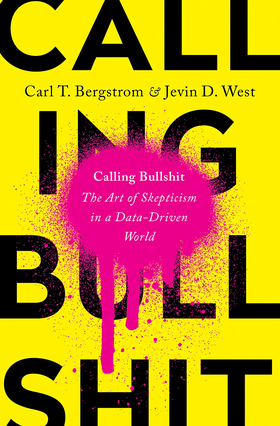Calling Bullshit
I can prove anything by statistics except the truth.

Turn on the news, log into social media, or just start talking to someone at the store and you're sure to run into it.
Complete and utter bullshit.
Some of it is easy to spot: The earth is flat, Area 51 is experimenting on aliens, airlines are spraying chemicals on us, the loch ness monster or bigfoot exists, Mattress Firms are laundering money, Alaska is trying to control everyone's minds, and the list goes on … for a depressingly long time.
Other times, bullshit can be tricky. Rampant food-stamps fraud, kills 99.9% of germs, chocolate as a weight loss supplement, rap music is deadly. Outside of scientific or journalistic circles, you would be forgiven for believing some of these claims or falling for their bullshit.
And that's exactly what Carl Bergstrom's and Jevin West's new book, Calling Bullshit, is trying to fix. Carl Bergstrom is a professor of Biology at the University of Washington who studies how information flows through scholarly circles. Jevin West is a data scientist and associate professor at the University of Washington who focuses on misinformation in science and society. Together they created a fun and relevant "how-to" book on calling out the bullshit we run into in our everyday lives.
In their book, Carl and Jeven argue, rather than spending weeks into fact checking every claim you hear, all you need to "call bullshit" on the vast majority of these false claims is to remain skeptical, use basic logic, and occasionally a quick web search. Even the imitating bullshit that hides behind a wall of statistics uses the same basic fallacies that gives all bullshit away, we just need practice spotting it. The best part of Carl's and Jeven's techniques is you don't have to be a data scientist, professional statistician or math prodigy to use them. And with the rise of the attention economy this book couldn't have come at a better time.
This book was fun, timely (especially for the upcoming US election), and enlightening. The book walks through case studies ranging from debunking food-stamp fraud to papers claiming to have built AI to detect criminality. Guiding us through how to spot the various forms of "new-school", data saturated bullshit we see everywhere today, from misleading visuals, equating correlation and causation, unrepresentative data, selection biases, problems with small sample sizes, and more. They even setup a website to help us practice spotting bullshit, like the fake images generated with cutting edge machine learning tools.
Whatever we call bullshit, whether it fools us or not, lies, spin, fake news, conspiracy theories and bullshit is everywhere. It's been with us forever and will likely remain when it all ends. The reason it's so prevalent is fairly simple. As an Italian programmer famously tweeted:
The bullshit asymmetry: the amount of energy needed to refute bullshit is an order of magnitude bigger than to produce it.
—Alberto Brandolini (@ziobrando)
I really enjoyed this book. Even if you're not into math and statistics, this book does an amazing job imparting the skills needed to spot logical fallacies using relevant examples and a ton of humor, which makes the book such a fun read that I would recommend to everyone.